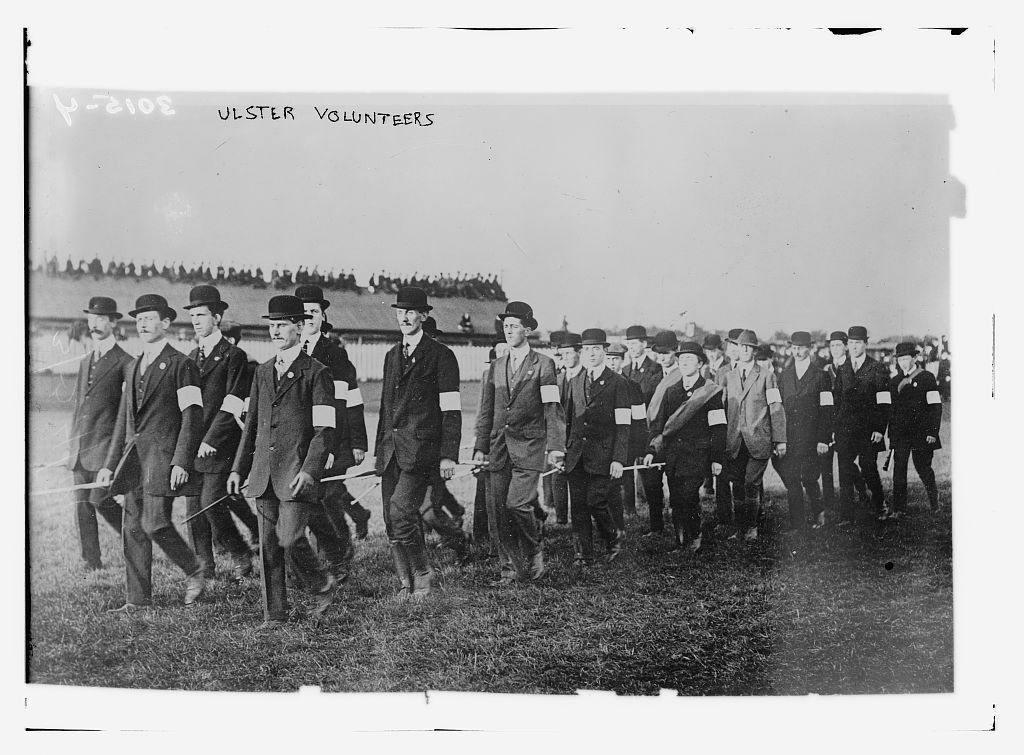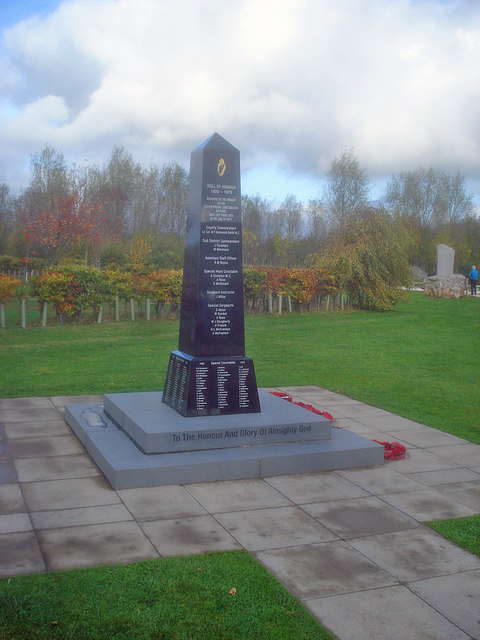|
Ulster Imperial Guards
The Ulster Imperial Guards were a short-lived loyalist paramilitary group organised in Belfast in November 1921 to prevent Northern Ireland being included in an independent Irish Free State. Newspaper reports suggested it consisted mainly of ex-servicemen, of whom 21,000 men were recruited in ten battalions. Led by Robert boyd and William Twaddell, the Ulster Imperial Guards outnumbered the attempt to revive the Ulster Volunteer Force and held an armoury of former UVF guns in Tamar Street in East Belfast. The demise of the organisation in 1922 may have been due to a combination of the partition arrangements in the Anglo-Irish Treaty The 1921 Anglo-Irish Treaty ( ga , An Conradh Angla-Éireannach), commonly known in Ireland as The Treaty and officially the Articles of Agreement for a Treaty Between Great Britain and Ireland, was an agreement between the government of the ..., Twaddell's assassination, and the recruitment of some of its members into the Ulster Special Con ... [...More Info...] [...Related Items...] OR: [Wikipedia] [Google] [Baidu] |
Belfast
Belfast ( , ; from ga, Béal Feirste , meaning 'mouth of the sand-bank ford') is the capital and largest city of Northern Ireland, standing on the banks of the River Lagan on the east coast. It is the 12th-largest city in the United Kingdom and the second-largest in Ireland. It had a population of 345,418 . By the early 19th century, Belfast was a major port. It played an important role in the Industrial Revolution in Ireland, briefly becoming the biggest linen-producer in the world, earning it the nickname "Linenopolis". By the time it was granted city status in 1888, it was a major centre of Irish linen production, tobacco-processing and rope-making. Shipbuilding was also a key industry; the Harland and Wolff shipyard, which built the , was the world's largest shipyard. Industrialisation, and the resulting inward migration, made Belfast one of Ireland's biggest cities. Following the partition of Ireland in 1921, Belfast became the seat of government for Northern Ireland ... [...More Info...] [...Related Items...] OR: [Wikipedia] [Google] [Baidu] |
Northern Ireland
Northern Ireland ( ga, Tuaisceart Éireann ; sco, label= Ulster-Scots, Norlin Airlann) is a part of the United Kingdom, situated in the north-east of the island of Ireland, that is variously described as a country, province or region. Northern Ireland shares an open border to the south and west with the Republic of Ireland. In 2021, its population was 1,903,100, making up about 27% of Ireland's population and about 3% of the UK's population. The Northern Ireland Assembly (colloquially referred to as Stormont after its location), established by the Northern Ireland Act 1998, holds responsibility for a range of devolved policy matters, while other areas are reserved for the UK Government. Northern Ireland cooperates with the Republic of Ireland in several areas. Northern Ireland was created in May 1921, when Ireland was partitioned by the Government of Ireland Act 1920, creating a devolved government for the six northeastern counties. As was intended, Northern Ireland ... [...More Info...] [...Related Items...] OR: [Wikipedia] [Google] [Baidu] |
Irish Free State
The Irish Free State ( ga, Saorstát Éireann, , ; 6 December 192229 December 1937) was a state established in December 1922 under the Anglo-Irish Treaty of December 1921. The treaty ended the three-year Irish War of Independence between the forces of the Irish Republic – the Irish Republican Army (IRA) – and British Crown forces. The Free State was established as a dominion of the British Empire. It comprised 26 of the 32 counties of Ireland. Northern Ireland, which was made up of the remaining six counties, exercised its right under the Treaty to opt out of the new state. The Free State government consisted of the Governor-General – the representative of the king – and the Executive Council (cabinet), which replaced both the revolutionary Dáil Government and the Provisional Government set up under the Treaty. W. T. Cosgrave, who had led both of these administrations since August 1922, became the first President of the Executive Council (prime minister). The ... [...More Info...] [...Related Items...] OR: [Wikipedia] [Google] [Baidu] |
William J
William is a male given name of Germanic origin.Hanks, Hardcastle and Hodges, ''Oxford Dictionary of First Names'', Oxford University Press, 2nd edition, , p. 276. It became very popular in the English language after the Norman conquest of England in 1066,All Things William"Meaning & Origin of the Name"/ref> and remained so throughout the Middle Ages and into the modern era. It is sometimes abbreviated "Wm." Shortened familiar versions in English include Will, Wills, Willy, Willie, Bill, and Billy. A common Irish form is Liam. Scottish diminutives include Wull, Willie or Wullie (as in Oor Wullie or the play ''Douglas''). Female forms are Willa, Willemina, Wilma and Wilhelmina. Etymology William is related to the given name ''Wilhelm'' (cf. Proto-Germanic ᚹᛁᛚᛃᚨᚺᛖᛚᛗᚨᛉ, ''*Wiljahelmaz'' > German ''Wilhelm'' and Old Norse ᚢᛁᛚᛋᛅᚼᛅᛚᛘᛅᛋ, ''Vilhjálmr''). By regular sound changes, the native, inherited English form of the name shoul ... [...More Info...] [...Related Items...] OR: [Wikipedia] [Google] [Baidu] |
Ulster Volunteers
The Ulster Volunteers was an Irish unionist, loyalist paramilitary organisation founded in 1912 to block domestic self-government ("Home Rule") for Ireland, which was then part of the United Kingdom. The Ulster Volunteers were based in the northern province of Ulster. Many Ulster Protestants and Irish unionists feared being governed by a nationalist Catholic-majority parliament in Dublin and losing their links with Great Britain. In 1913, the militias were organised into the Ulster Volunteer Force (UVF) and vowed to resist any attempts by the British Government to impose Home Rule on Ulster. Later that year, Irish nationalists formed a rival militia, the Irish Volunteers, to safeguard Home Rule. In April 1914, the UVF smuggled 25,000 rifles into Ulster from Imperial Germany. The Home Rule Crisis was interrupted by the First World War. Much of the UVF enlisted with the British Army's 36th (Ulster) Division and went to fight on the Western Front. After the war, the British ... [...More Info...] [...Related Items...] OR: [Wikipedia] [Google] [Baidu] |
Anglo-Irish Treaty
The 1921 Anglo-Irish Treaty ( ga , An Conradh Angla-Éireannach), commonly known in Ireland as The Treaty and officially the Articles of Agreement for a Treaty Between Great Britain and Ireland, was an agreement between the government of the United Kingdom of Great Britain and Ireland and representatives of the Irish Republic that concluded the Irish War of Independence. It provided for the establishment of the Irish Free State within a year as a self-governing dominion within the "community of nations known as the British Empire", a status "the same as that of the Dominion of Canada". It also provided Northern Ireland, which had been created by the Government of Ireland Act 1920, an option to opt out of the Irish Free State (Article 12), which the Parliament of Northern Ireland exercised. The agreement was signed in London on 6 December 1921, by representatives of the British government (which included Prime Minister David Lloyd George, who was head of the British delegates) ... [...More Info...] [...Related Items...] OR: [Wikipedia] [Google] [Baidu] |
Ulster Special Constabulary
The Ulster Special Constabulary (USC; commonly called the "B-Specials" or "B Men") was a quasi-military reserve special constable police force in what would later become Northern Ireland. It was set up in October 1920, shortly before the partition of Ireland. It was an armed corps, organised partially on military lines and called out in times of emergency, such as war or insurgency. It performed this role most notably in the early 1920s during the Irish War of Independence and the 1956-1962 IRA Border Campaign. During its existence, 95 USC members were killed in the line of duty. Most of these (72) were killed in conflict with the IRA in 1921 and 1922. Another 8 died during the Second World War, in air raids or IRA attacks. Of the remainder, most died in accidents but two former officers were killed during the Troubles in the 1980s. The force was almost exclusively Ulster Protestant and as a result was viewed with great mistrust by Catholics. It carried out several revenge ... [...More Info...] [...Related Items...] OR: [Wikipedia] [Google] [Baidu] |
1921 Establishments In Northern Ireland
Nineteen or 19 may refer to: * 19 (number), the natural number following 18 and preceding 20 * one of the years 19 BC, AD 19, 1919, 2019 Films * ''19'' (film), a 2001 Japanese film * ''Nineteen'' (film), a 1987 science fiction film Music * 19 (band), a Japanese pop music duo Albums * ''19'' (Adele album), 2008 * ''19'', a 2003 album by Alsou * ''19'', a 2006 album by Evan Yo * ''19'', a 2018 album by MHD * ''19'', one half of the double album ''63/19'' by Kool A.D. * ''Number Nineteen'', a 1971 album by American jazz pianist Mal Waldron * ''XIX'' (EP), a 2019 EP by 1the9 Songs * "19" (song), a 1985 song by British musician Paul Hardcastle. * "Nineteen", a song by Bad4Good from the 1992 album ''Refugee'' * "Nineteen", a song by Karma to Burn from the 2001 album ''Almost Heathen''. * "Nineteen" (song), a 2007 song by American singer Billy Ray Cyrus. * "Nineteen", a song by Tegan and Sara from the 2007 album '' The Con''. * "XIX" (song), a 2014 song by Slipknot. ... [...More Info...] [...Related Items...] OR: [Wikipedia] [Google] [Baidu] |
1922 Disestablishments In Northern Ireland
Nineteen or 19 may refer to: * 19 (number), the natural number following 18 and preceding 20 * one of the years 19 BC, AD 19, 1919, 2019 Films * ''19'' (film), a 2001 Japanese film * ''Nineteen'' (film), a 1987 science fiction film Music * 19 (band), a Japanese pop music duo Albums * ''19'' (Adele album), 2008 * ''19'', a 2003 album by Alsou * ''19'', a 2006 album by Evan Yo * ''19'', a 2018 album by MHD * ''19'', one half of the double album ''63/19'' by Kool A.D. * ''Number Nineteen'', a 1971 album by American jazz pianist Mal Waldron * ''XIX'' (EP), a 2019 EP by 1the9 Songs * "19" (song), a 1985 song by British musician Paul Hardcastle. * "Nineteen", a song by Bad4Good from the 1992 album ''Refugee'' * "Nineteen", a song by Karma to Burn from the 2001 album ''Almost Heathen''. * "Nineteen" (song), a 2007 song by American singer Billy Ray Cyrus. * "Nineteen", a song by Tegan and Sara from the 2007 album '' The Con''. * "XIX" (song), a 2014 song by Slipknot. ... [...More Info...] [...Related Items...] OR: [Wikipedia] [Google] [Baidu] |
.png)



